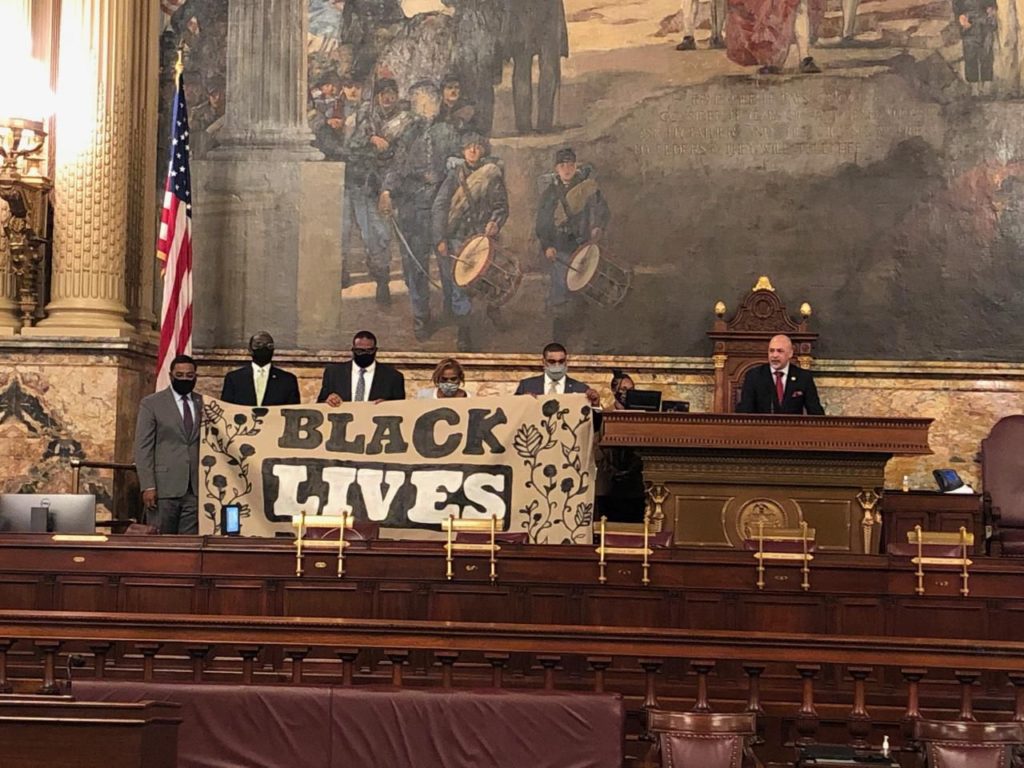Spotlight PA is an independent, nonpartisan newsroom powered by The Philadelphia Inquirer in partnership with PennLive/The Patriot-News, TribLIVE/Pittsburgh Tribune-Review, and WITF Public Media. Sign up for our free newsletters.
HARRISBURG — A Pennsylvania database of police personnel records lauded as a national model is riddled with loopholes that raise serious questions about its ability to flag police officers with histories of misconduct, a Spotlight PA review has found.
The state law, passed in 2020 after the police murder of George Floyd in Minneapolis and the ensuing protests, created the database and required every law enforcement agency in the state to use it, but did not include any enforcement measures if they failed to comply.
Law enforcement agencies must upload records when an officer leaves their employment, but not if an officer receives a warning or suspension and keeps their job.
Negotiations to get the bill passed with near-unanimous approval also narrowed the circumstances under which an agency has to report their decision to hire an officer with a blemished past. Only three such reports have been filed, according to the commission tasked with overseeing the database.
Legislators and officials from both political parties initially hailed the database as a crucial step toward ensuring police officers with histories of serious wrongdoing don’t bounce from department to department undetected.
Attorney General Josh Shapiro, now the Democratic candidate for governor in this year’s general election, recently took credit for rallying support for the database among law enforcement groups. In late May, President Joe Biden signed an executive order that created a similar national accountability database to track police misconduct.
“Our Pennsylvania effort was a clear building block that showed a path for this national effort,” Shapiro said in a news release supporting the executive order.
So far, more than 1,100 agencies — likely the majority of law enforcement agencies in the state — have enrolled to use the database and about 61% of those have uploaded records.
While there are more than 2,500 individual files in the database, separation records of any law enforcement officers who left their job before the law took effect are not required to be added — another gap that could weaken the law’s efficacy.
Pennsylvania State Police report there have been 2,700 inquiries from hiring agencies against the database since it went live in June 2021.
Consulting the database before hiring is required, but there are “no penalties in the act for non-compliance,” according to State Police. That’s an unusual omission for a law regulating a governmental agency, said David Rudovsky, a civil rights and criminal defense attorney who teaches law at the University of Pennsylvania.
“You usually don’t pass a law and say, here’s what we’d like you to do: You ought to pay your taxes, right? You ought to wear a seatbelt,” he said. “There are hundreds of thousands of regulations out there, almost all of which have some kind of consequence.”
And because the database is not public under Pennsylvania’s Right-to-Know law, it is nearly impossible to get a deeper understanding of how agencies are interpreting the rule or what kinds of misconduct records are being included in the archive.
“While the separation database is a quality starting point to achieve Governor Wolf’s police reform goals, the program is voluntary by design and cannot be more effective without legislative changes,” said Myles Snyder, a Pennsylvania State Police spokesperson. “We welcome and encourage changes from the General Assembly to ensure compliance across the board and to further track the state’s bad actors in law enforcement.”
In an interview with Spotlight PA, Shapiro said officials involved in drafting the law never intended to leave out enforcement measures. The more than 1,100 agencies that are participating would likely cover more than 90% of Pennsylvanians, he said.
“I think just calling it voluntary is a bit of an understatement,” Shapiro said.
“If you don’t participate, that’s against the law. Could the enforceability provision be strengthened? Maybe, and I would be supportive of that if that’s where the group wants to go.”
‘Radically diluted’
In May 2020, a bill introduced by state Rep. Chris Rabb (D., Philadelphia) had been languishing for nearly a year.
His legislation proposed a database for tracking the officers who leave a Pennsylvania police department, as well as their conduct on the job.
His bill would have required police agencies to record all disciplinary actions and notify the public of their intent to hire someone who had “substantiated allegations, substantiated complaints or completed or ongoing investigations” against them in 10 categories: the use of excessive force, harassment, theft, discrimination, sexual abuse, sexual misconduct, domestic violence, coercion of a false confession, filing a false report, or a judicial finding of dishonesty.
It had not yet gotten a committee hearing when a Minneapolis police officer with a history of misconduct murdered George Floyd, a Black man suspected of using a counterfeit $20 bill.
As people across the country took to the streets in protest, the Pennsylvania Legislative Black Caucus blocked the state Speaker of the House, then Mike Turzai (R., Allegheny), from ascending the rostrum and starting session.
For more than an hour, the Democratic legislators demanded that the Republicans who control the chamber and committees where bills sat unheard take meaningful action to hold police officers accountable.

Over the next two weeks, Shapiro’s office pulled together a coalition of law enforcement officials to rally support behind accountability measures. The group included police chiefs, union representatives, and prosecutors who wanted to make it easier to identify “bad police” during the hiring process, he said.
The database that emerged out of those conversations adopted most of Rabb’s original concepts, but the addition of three words “radically diluted” his vision, Rabb said.
The bill that passed in June 2020 requires agencies to only publicize decisions to hire candidates who received “final and binding” discipline, meaning an officer either voluntarily accepted a punishment or it went through formal adjudication.
“Most transgressions do not get resolved, and so they are very rarely final and binding,” Rabb said.
In conversations with law enforcement officials, Shapiro said everyone agreed the database should not contain records of every complaint made against an officer because some end up being unfounded.
“That’s not fair to the police officer,” Shapiro said. “I think everybody was very sensitive to making sure that you couldn’t just have somebody random file a complaint, get it in the database, and then a month later, it gets resolved, but it’s still in the database.”
If an agency wants to move forward with a hire despite records outlining discipline for serious misconduct, leadership must send their reasoning to the state group responsible for training local law enforcement.
Only three such hiring reports have been filed with the Municipal Police Officers Education and Training Commission. Spotlight PA has filed a Right-To-Know request for those reports, which are one of the few kinds of records available to the public under the law.
Rabb said it’s hard to know if the low number is good or bad.
It could either mean the database is working, and having to file a publicly accessible hiring report is enough of a deterrent to keep agencies from taking in people with spotty records. Or it could mean the database isn’t capturing enough of the actual misconduct that would trigger a report, he said.
“They can be hiring a bunch of folks who are equally bad, but whose issues were never resolved,” Rabb said. “They weren’t final and binding. It doesn’t trigger a hiring report. So let’s call them yellow flags, deep yellow flags.”
David Harris, a law professor at the University of Pittsburgh, agrees. He said the lack of transparency and the unclear language in the law leave “a giant hole through which a lot of misconduct can escape.”
By not requiring the hiring reports to capture officers who left before disciplinary proceedings were concluded, “you basically hollowed out the effect of the law for a large proportion of the cases,” he said.
‘Sword of Damocles’
If agencies don’t follow the law, they risk litigation and can have their accreditation stripped, said Jacklin Rhoads, a spokesperson for the attorney general. But accreditation is a third party process that is also voluntary.
The Pennsylvania Chiefs of Police Association, an organization independent from the state government, assesses agencies that apply for accreditation.
As part of the accreditation assessment, the association checks that departments are following state laws, including the new requirements for reporting to and checking the misconduct database, its president, David Steffen, said.
Steffen is also chief of the Northern Lancaster County Regional Police Department, where he has adopted the law into agency policy. But of the more than 1,100 law enforcement agencies in Pennsylvania, only 142 currently have the association’s certification.
“It’s difficult to understand why more agencies aren’t accredited,” Steffen said.
No police agency wants to make a bad hire, he said, and the database and required reports are an added deterrent for law enforcement agencies to avoid hires with a history of wrongdoing.
“I have no idea why anybody would want to do that,” he said. “Because I wouldn’t want the sword of Damocles holding over me for however long that individual’s employed by the agency, or however long I’m employed by the agency.”
WHILE YOU’RE HERE… If you learned something from this story, pay it forward and become a member of Spotlight PA so someone else can in the future at spotlightpa.org/donate. Spotlight PA is funded by foundationsand readers like you who are committed to accountability journalism that gets results.



